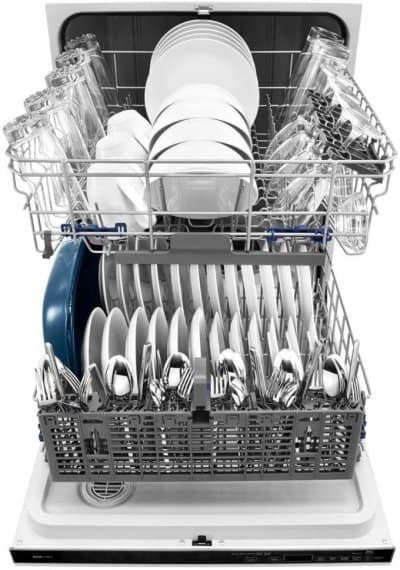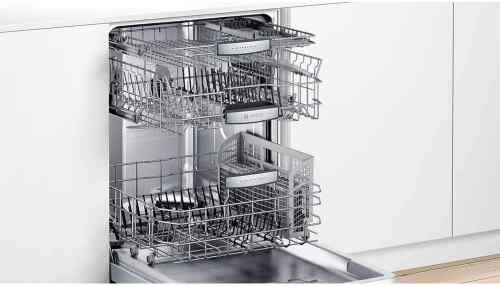Are you noticing a white, powdery residue on your dishes after running them through the dishwasher? This can be frustrating, and it may leave you wondering what’s causing this issue and how to fix it. In this article, we’ll explore the causes of white chalky residue in dishwashers and provide solutions to prevent it from happening again.
Table of Contents
Causes of White Chalky Residue in Dishwashers
Several factors can cause white chalky residue in dishwashers. Let’s take a closer look at each of them.
- Hard Water
- Detergent Residue
- Clogged Spray Arms
- Incorrect Loading
- Old Dishwasher
- High Mineral Content in Detergent
Hard Water
One of the most common causes of white chalky residue in dishwashers is hard water. Hard water contains a high amount of minerals like calcium and magnesium, which can form a buildup on dishes and in the dishwasher.
Detergent Residue
If you’re using too much detergent, it can leave a residue on dishes and in the dishwasher. This can happen if you’re not measuring the detergent correctly, or if you’re using the wrong type of detergent for your dishwasher.
Clogged Spray Arms
The spray arms in your dishwasher are responsible for distributing water and detergent throughout the machine. If they become clogged with debris or mineral buildup, they won’t work effectively, and your dishes may be left with white chalky residue.
Incorrect Loading
Loading your dishwasher incorrectly can cause the dishes to block the spray arms, preventing them from distributing water and detergent effectively. This can result in white chalky residue on dishes.
Old Dishwasher
If your dishwasher is old, it may not be functioning correctly. The spray arms and other parts may not be working as they should, resulting in white chalky residue on dishes.
High Mineral Content in Detergent
Some dishwasher detergents contain high levels of minerals, which can cause white chalky residue on dishes.

Solutions to Remove White Chalky Residue
Here are some solutions to remove white chalky residue from your dishes:
- Vinegar Rinse
- Use a Dishwasher Cleaner
- Add a Rinse Aid
- Check and Clean the Spray Arms
Vinegar Rinse
Add a cup of white vinegar to the bottom of the dishwasher and run a normal cycle. This will help to remove any mineral buildup and detergent residue from the dishwasher and dishes.
Use a Dishwasher Cleaner
Use a dishwasher cleaner to remove any buildup on the inside of your dishwasher. Follow the instructions on the cleaner, and run a normal cycle after using it.
Add a Rinse Aid
A rinse aid can help to prevent white chalky residue from forming on dishes. It works by reducing the surface tension of the water, allowing it to rinse away more effectively.
Check and Clean the Spray Arms
Check the spray arms for any clogs or debris. Use a toothbrush or other small brush to clean them out. This will help
to ensure that water and detergent are distributed evenly throughout the dishwasher and that your dishes come out clean and free from white chalky residue.
Prevention Methods to Avoid White Chalky Residue
Here are some preventive methods to avoid white chalky residue from forming on your dishes:
- Use Soft Water
- Choose a Detergent with Low Mineral Content
- Load the Dishwasher Properly
- Clean the Dishwasher Regularly
Use Soft Water
If you have hard water, consider using a water softener to reduce the mineral content. This can help to prevent white chalky residue from forming on your dishes.
Choose a Detergent with Low Mineral Content
Choose a dishwasher detergent that has a low mineral content. Look for detergents that are specifically designed for use in hard water areas.
Load the Dishwasher Properly
Make sure that you’re loading your dishwasher properly. Avoid blocking the spray arms, and make sure that your dishes are facing the right way.
Clean the Dishwasher Regularly
Clean your dishwasher regularly to prevent mineral buildup and detergent residue from forming. Follow the manufacturer’s instructions for cleaning your dishwasher.
Conclusion
White chalky residue on dishes is a common problem for many people. However, by understanding the causes and using the solutions and preventive methods mentioned in this article, you can keep your dishes clean and free from residue.
FAQs
- Can I use regular vinegar instead of white vinegar for a vinegar rinse?
- No, you should use white vinegar. Regular vinegar can stain your dishes.
- How often should I use a dishwasher cleaner?
- It depends on how often you use your dishwasher. If you use it frequently, you should use a dishwasher cleaner every 3-4 months.
- Can I use a rinse aid in my dishwasher if I have a septic system?
- Yes, you can use a rinse aid in your dishwasher if you have a septic system. Look for a rinse aid that is septic-safe.
- Should I use hot or cold water to rinse my dishes before putting them in the dishwasher?
- You should use hot water to rinse your dishes before putting them in the dishwasher. This will help to remove any food particles and make sure that your dishes come out clean.
- Can I use lemon juice instead of vinegar for a vinegar rinse?
- Yes, you can use lemon juice instead of vinegar. However, it may not be as effective as white vinegar.

